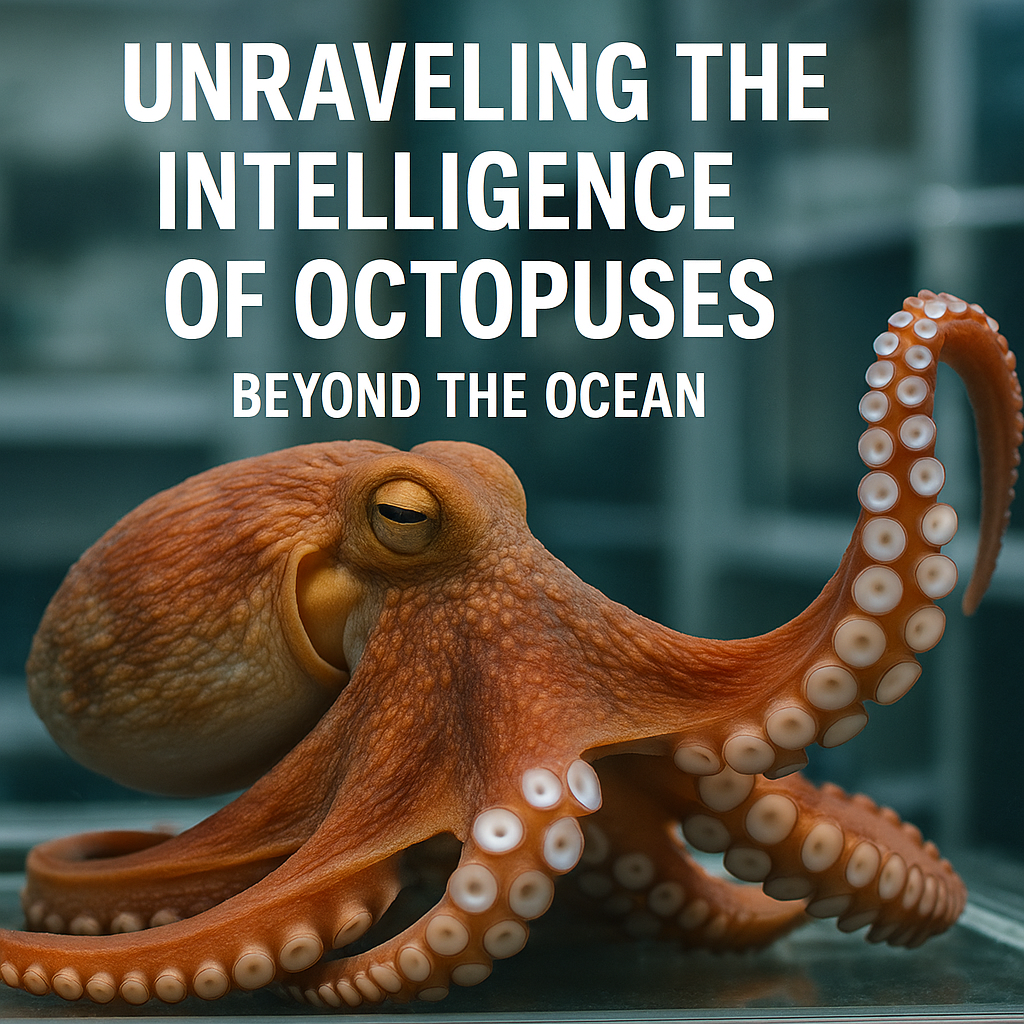Unlike humans and other vertebrates, octopuses have a decentralized nervous system. About two-thirds of their neurons are located in their arms, meaning each arm can “think” and react independently.
Key Features of Octopus Intelligence:
-
Nine Brains in One: A central brain coordinates high-level decisions, while each arm has its own neural ganglia for autonomous movement.
-
No Bones, No Limits: Their soft bodies allow them to squeeze into tiny spaces, enhancing their problem-solving abilities.
-
Rapid Learning: Experiments show octopuses can navigate mazes, open jars, and even recognize individual humans.
A 2020 study published in Cell revealed that octopuses can edit their own RNA, allowing them to adapt quickly to environmental changes—a trait almost unheard of in other animals.
2. Problem-Solving Skills: Octopuses Outsmarting Scientists
Octopuses are natural escape artists. Aquariums worldwide report octopuses sneaking out of tanks, disassembling equipment, and even stealing fish from neighboring enclosures.
Famous Examples of Octopus Intelligence:
-
Inky’s Great Escape: A New Zealand octopus named Inky slipped out of his tank, crossed the floor, and escaped into the ocean through a drainpipe.
-
Tool Use in the Wild: Veined octopuses in Indonesia have been observed carrying coconut shells to use as portable shelters.
-
Memory and Recognition: Octopuses can remember solutions to puzzles for months, suggesting long-term memory capabilities.
Researchers at the University of Cambridge found that octopuses can use visual cues to solve complex tasks—something previously thought to be limited to vertebrates.
3. Camouflage & Communication: Masters of Disguise
Octopuses don’t just change color for camouflage—they also use patterns to communicate. Their skin contains chromatophores, specialized cells that expand or contract to produce different colors and textures in milliseconds.
How Octopus Camouflage Works:
-
Instant Color Change: They mimic rocks, coral, and even other sea creatures to evade predators.
-
Texture Manipulation: Special muscles allow them to create bumps and spikes to blend in perfectly.
-
Dynamic Signaling: Some species flash bold patterns to intimidate rivals or attract mates.
A study in Nature revealed that the common octopus (Octopus vulgaris) can detect light with its skin, meaning it might “see” with its entire body.
4. Social Intelligence: Are Octopuses Loners or Secretly Social?
For years, scientists believed octopuses were solitary creatures. However, recent discoveries suggest some species engage in complex social behaviors.
Surprising Social Behaviors:
-
Octopus Cities: In Jervis Bay, Australia, a group of octopuses was found living in a communal den, challenging the idea that they are entirely antisocial.
-
Playful Nature: Some octopuses in captivity have been observed “playing” with objects, a sign of curiosity and intelligence.
-
Mating Strategies: Male octopuses sometimes disguise themselves as females to avoid aggressive rivals.
A 2021 study in Current Biology documented octopuses throwing shells and sand at each other—possibly the first evidence of deliberate projectile use in invertebrates.
5. Octopus Intelligence vs. Human Intelligence: A Different Kind of Smart
Octopuses are intelligent in ways that are fundamentally different from humans. While we rely on centralized brains and social learning, octopuses operate with distributed cognition and individual adaptability.
Key Differences:
| Human Intelligence | Octopus Intelligence |
|---|---|
| Centralized brain | Decentralized neurons in arms |
| Social learning | Mostly solitary problem-solving |
| Long-term cultural knowledge | Short-term individual adaptation |
This unique intelligence makes them fascinating subjects for robotics, neuroscience, and even artificial intelligence research.
6. The Future of Octopus Research: What We Still Don’t Know
Despite decades of study, octopuses continue to surprise scientists. Some unanswered questions include:
-
Do octopuses dream? Their sleep patterns resemble REM sleep in mammals.
-
Can they feel emotions? Their complex behaviors suggest possible emotional capacity.
-
How do they learn so quickly? Their RNA editing ability remains a mystery.
With advancements in underwater robotics and AI, researchers hope to uncover even more about these deep-sea geniuses.
Conclusion: Why Octopus Intelligence Matters
Octopuses challenge our understanding of intelligence, proving that complex cognition doesn’t require a human-like brain. Their problem-solving skills, adaptability, and even social behaviors make them one of the most intriguing species on Earth.
As we continue to explore ocean depths, the octopus serves as a reminder that intelligence evolves in unexpected ways—far beyond what we once thought possible.




Leave a Comment